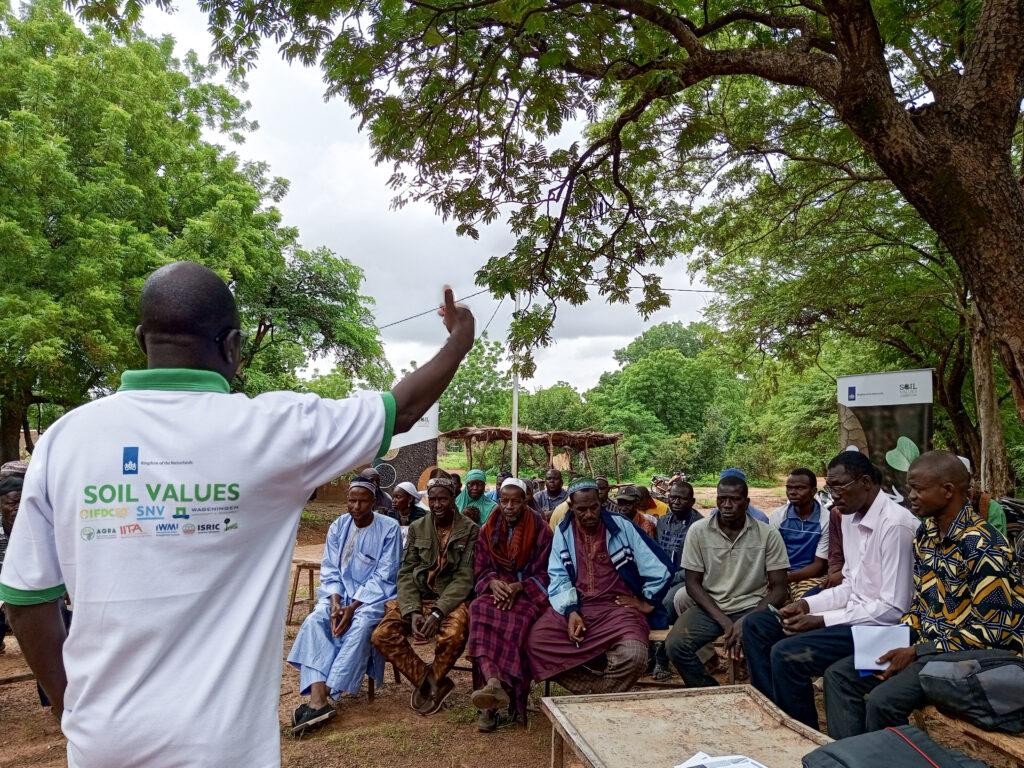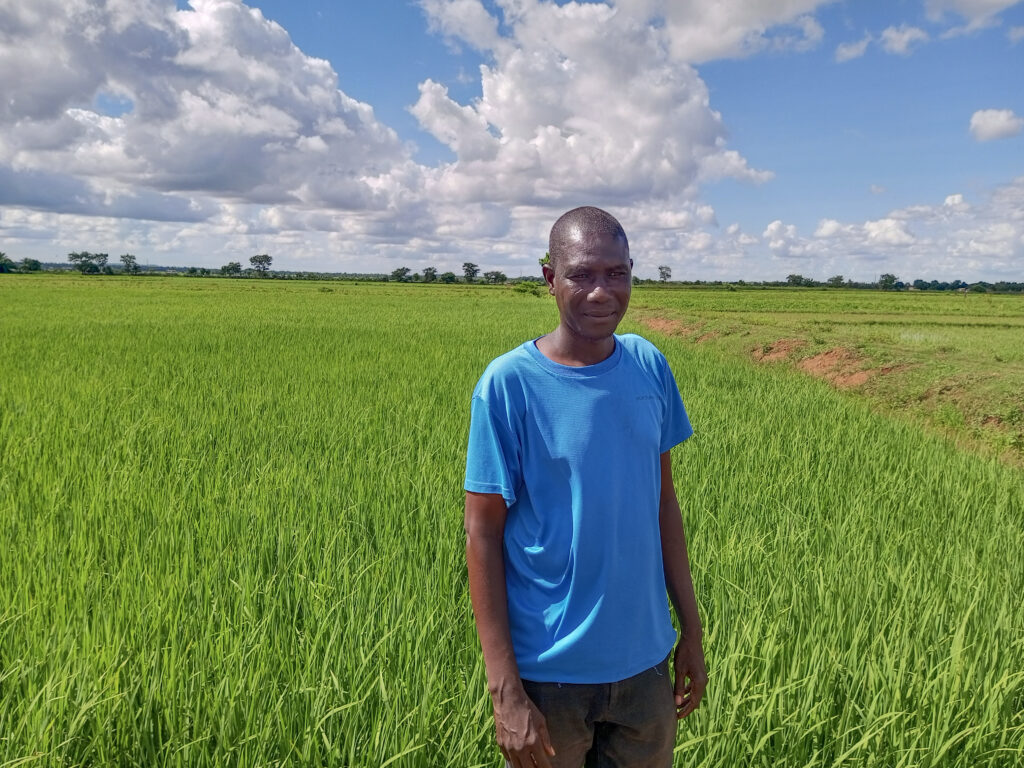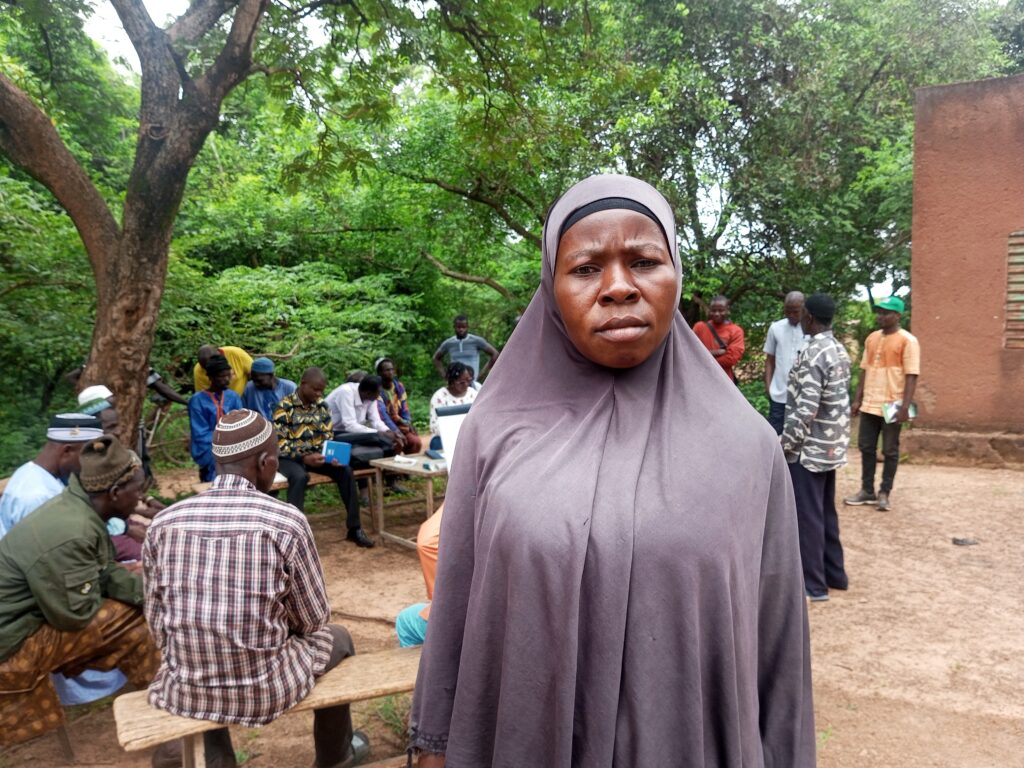
In July 2024, the Soil Values program initiated participatory soil fertility and soil health diagnostic activities with small-scale agricultural producers and livestock breeders living in watershed and sub-watershed communities in identified areas of Burkina Faso, Mali, Niger, and northern Nigeria.
Community members met with Soil Values teams and discussed their concerns about the management of soil fertility and soil health in their respective areas as well as their expectations for solutions. Following these discussions, community members and the Soil Values teams co-designed beneficial activities to be carried out in 2024.
The Soil Values program organized these diagnostic activities with a synergistic approach, aiming to strengthen the actions of existing projects and programs already working on soil health and soil fertility in the Sahel.
Soil Values worked with partners already working in watersheds and sub-watersheds, such as the West Africa Food Systems Resilience Program (FSRP); the Agri-Food Program for Integrated Resilience and Economic Development in the Sahel (Pro-ARIDES) in Burkina Faso, Mali, and Niger; and HortiNigeria’s Women In Agriculture (WIA) projects in Nigeria.
“Localities are experiencing problems with soil fertility and health, exacerbated by the effects of climate shifts. We recommend a concerted approach and hope that communities will be at the heart of activities to take full advantage of them.”
Boureima Bengali, Second Deputy Mayor of Kaboïla in the Sikasso region of Mali
These community-level diagnostic activities aimed to reveal the constraints and needs in terms of soil fertility management in watersheds and sub-watersheds in respective countries. These activities also enabled the team to assess the state of natural resources such as water, agricultural land, forests, and more, at the level of watersheds and sub-watersheds. The team informed the intervention communities of their findings, encouraging collaboration in co-designing these solutions and future activities.
Watersheds and Sub-Watersheds, at the Heart of Soil Values Interventions in the Sahel
Watersheds and sub-watersheds constitute the central elements on which Soil Values activities are focused through national projects and programs. The diagnostic activities have involved the participation of several watershed and sub-watershed communities to identify constraints to sustainable agricultural land management in their respective locations. In Nigeria, communities involved include Sani Babangida in Bichi Local Government Area (LGA), Dadauda and Yar Titi in Bagwai LGA, and Fajewa in Bagwai LGA, all of which are in Kano State. The Fajewa watershed covers 16,514 hectares with a total storage capacity of 1.06 million m³, while the Yar Titi watershed covers 20,857 hectares.
In Burkina Faso, communities involved in diagnostic activities include Diarradougou and Koumbadougou, of the Kou sub-watershed in the Hauts-Bassins region. This sub-watershed covers an area of 1,823 km², including the localities of Bama, Bobo-Dioulasso, and Péni.
In Mali, the involved communities include Kaboïla and Mandela in the Lotio sub-watershed, in the Sikasso region, which benefits from an average rainfall of 1,300 mm in a typical year. In Niger, communities involved include Nadabar, Tsernaoua, and Doguéraoua in the Maggia watershed, in the Tahoua region.

The Maggia Basin, which extends into the southern agricultural belt of Niger and the northwestern part of Nigeria, has a total area of 5,616 km². Communities comprising agricultural producers and pastoralists from various ethnic groups use the water resources of these watersheds for various crops and animals during different seasons.
With the support of the Soil Values program, communities have proposed various activities to address soil management problems.
Tailored Responses to Reduce the Challenges Faced by Communities in Agricultural Land Management
The participatory diagnostic process included several important steps. First, the mixed teams with members from Soil Values, FSRP, Pro-ARIDES, and HortiNigeria/WIA engaged with various technical services directly supporting the communities, including those of agriculture; animal and fishery resources; and environment, sustainable development, and local authorities.
These teams then held focus groups considering gender intersectionality issues with communities. Tools such as the problem and solution tree were used to understand the challenges related to soil health and fertility. Field visits were carried out to observe soil restoration actions and agricultural landscapes undertaken by existing national projects and programs.
Discussions with the communities confirmed that the problems related to soil health and fertility in respective localities are the result of climatic and anthropogenic actions, including deforestation, extensive agriculture, water erosion, poor management of hydro-agricultural developments and agricultural landscapes, and low access to and poor use of fertilizers and pesticides, among other issues.

Boureima Bengali, Second Deputy Mayor of Kaboïla in the Sikasso region of Mali, remarked, “Localities are experiencing problems with soil fertility and health, exacerbated by the effects of climate shifts. We recommend a concerted approach and hope that communities will be at the heart of activities to take full advantage of them.” The co-design approach is therefore well aligned with the wishes of local authorities in the countries where the Soil Values program is implemented.
These proposals include capacity building on the production of quality organic and biological fertilizers, groundwater mobilization and management techniques, fertilizer application technologies, the revitalization of land commissions for better management and security of agricultural land, participatory planning and organization of the landscape, and other plans. In Niger, the small-scale agricultural producers hope that the Soil Values program’s support will remedy several critical problems, including the subsidence of the water table, the regeneration of depleted soils, and the slowing of watercourse silting in the watershed and existing structures on which they depend.
With a view to further improve decision-making on Soil Values interventions, local communities have mapped natural resources and specified development actors. They have drawn up an inventory of environmental assets and shortcomings and identified state organizations or structures in their localities involved in supporting the development of agricultural activities.
Through the program’s implementing consortium and knowledge partners, and in collaboration with communities, Soil Values will provide interventions with innovative solutions and technologies adapted to the realities these localities face. Soil Values will contribute to eradicating problems related to soil health and soil fertility in these localities of the Sahel.
Funded by the Directorate-General for International Cooperation (DGIS), Soil Values is being implemented over 10 years (2024-2034) by the International Fertilizer Development Center (IFDC), in consortium with SNV and Wageningen University and Research (WUR) and in collaboration with knowledge partners, such as AGRA, the Center for International Forestry Research and World Agroforestry (CIFOR-ICRAF), the International Institute of Tropical Agriculture (IITA), ISRIC – World Soil Information, and the International Water Management Institute (IWMI).




